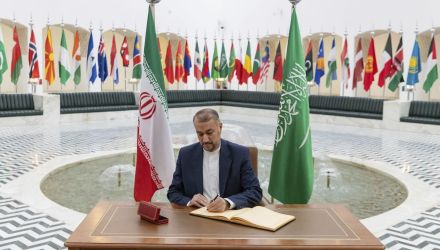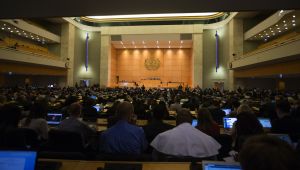This week, the leaders of the G8 industrial democracies will gather in France. Among other things, they will discuss what steps must be taken to strengthen global nuclear safety (designed to prevent nuclear accidents) and global nuclear security (designed to prevent terrorist sabotage or theft of nuclear materials) in the aftermath of the tragedy at Fukushima. These discussions will feed in to a ministerial meeting in late June at the International Atomic Energy Agency (IAEA). The world community should take new actions in five key areas.
First, the international community should adopt higher safety standards. Nuclear facilities must be better prepared for the possibility of losing both normal and backup electricity, and for possible damage to their cooling systems, two of the key drivers of problems at Fukushima. Spent fuel pools must be managed in a way that minimizes the risk of fuel melting or fires if the water drains. Fortunately, there are many actions that could be taken for very modest costs – such as buying mobile diesel generators that could quickly be moved to sites that had lost power, or interspersing cool fuel assemblies with hot ones in the pool, so the hot ones are not all heating each other up. Ultimately, much of the fuel should be moved out of pools into much safer dry casks.
Second, the world needs to take steps to protect nuclear facilities and materials from terrorist action, not just accidents. At many nuclear facilities, the security measures in place today are far weaker than the safety measures. But there is clear evidence that terrorists have considered sabotage of nuclear facilities, and have attempted to get stolen nuclear material and to recruit the expertise needed to turn it into a crude nuclear bomb, capable of incinerating the heart of a major city. The probability of such events may not be high, but the consequences would be catastrophic, justifying urgent action to reduce the risk. Here, too, the world needs higher standards to ensure that every stock of potential nuclear bomb material and every nuclear facility that could cause a catastrophe if sabotaged is effectively protected.
Third, emergency preparedness and response needs to be improved. Nuclear operators and the institutions around them – local police, fire, and emergency departments – must put in place more effective emergency response plans, and conduct regular exercises to make sure all the key players know what they need to do in a crisis. The IAEA’s emergency response system should be strengthened, to ensure that it is able to assess information independently and quickly in order to inform the world about the risks, and that it is also able to provide more effective assistance in responding to a crisis.
Fourth , every state operating major nuclear facilities should ask for independent, international teams to review the safety and security measures now in place. Such completedly independent reviews could help rebuild public confidence, and identify issues that may have been overlooked. Reactors are already subject to peer review by an industry group, but most have never had an IAEA safety review, and even fewer have ever had any international review of their security measures.
Carrying out reviews of all such facilities would be a major effort, requiring people and money. But the reviewers could be national experts loaned to the IAEA, rather than IAEA employees (as has generally been the case with past IAEA safety and security review teams). Only a modest increase in the IAEA budget would be needed.
Fifth, over time, states should negotiate more legally binding approaches – as Russia has now proposed. Today, IAEA safety standards are widely followed, but they are not legally binding, and the IAEA has no authority to inspect to see whether states are putting effective safety and security measures in place. But nuclear disasters can have effects far beyond national borders, giving every state a strong interest in ensuring that other states are fulfilling their nuclear safety and security responsibilities.
The lesson of Fukushima is that our beliefs that particular disastrous events are extremely unlikely may be wrong. We need to be prepared for surprises. If there are simple, cost-effective steps that can address a danger, they should be taken, even if the danger seems unlikely to arise.
The Fukushima tragedy has opened a window for action to strengthen nuclear safety and security – steps which could make it possible to expand nuclear energy to help respond to climate change without taking on undue risks. If this opportunity is not seized, those affected by Fukushima will have suffered in vain. The time for action is now.
Matthew Bunn, an associate professor at the Harvard Kennedy School and a former advisor in the White House Office of Science and Technology Policy, is the lead author of the Securing the Bomb series of reports. Olli Heinonen, a Senior Fellow at the Kennedy School’s Belfer Center for Science and International Affairs, is a former Deputy Director-General for Safeguards of the IAEA.
Statements and views expressed in this op-ed are solely those of the author and do not imply endorsement by Harvard University, Harvard Kennedy School, or the Belfer Center for Science and International Affairs.
Bunn, Matthew and Olli Heinonen. "Preventing the Next Fukushima." Belfer Center for Science and International Affairs, Harvard Kennedy School, May 26, 2011.






